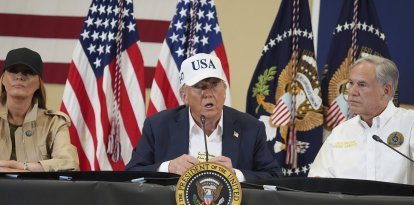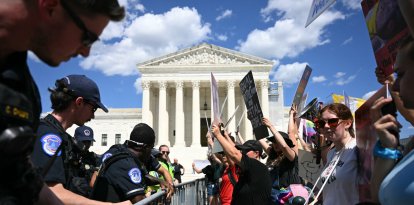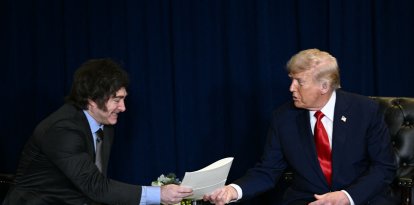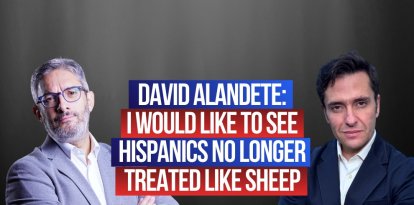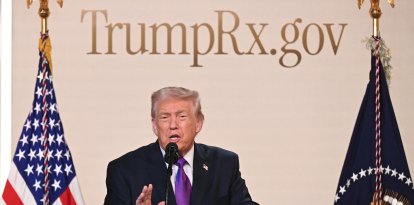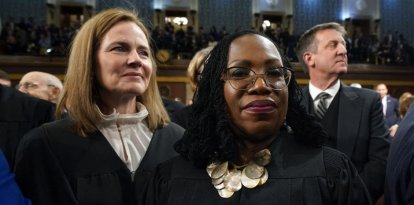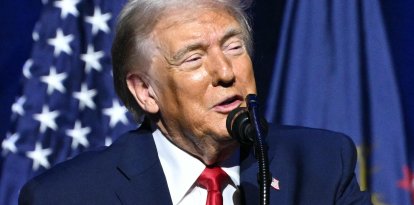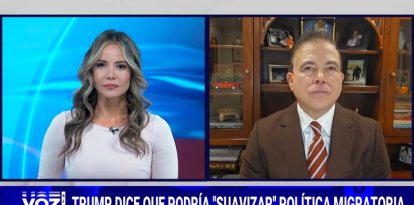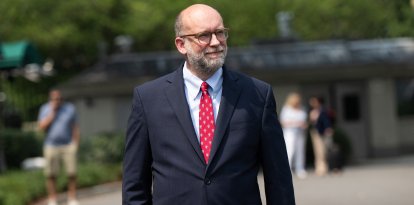The end is near: The Manhattan Prosecutor's Office finally concludes its closing arguments against Trump after almost six hours of presentation
Critics point out that prosecutors were unable to demonstrate during their arguments what electoral crime the former president committed.

(AFP)
After Donald Trump’s defense attempted in their final arguments to discredit the testimony of the Manhattan District Attorney’s star prosecutor, Michael Cohen, prosecutor Joshua Steinglass was in charge of presenting the State’s arguments during almost six hours of presentation. This provoked an ultimatum from Judge Juan Merchán and a humorous one-word reaction from the former Republican president himself on his Truth social network: “Boring.”
But beyond Trump’s yawns, Steinglass’s testimony will ultimately be crucial to the outcome of the first criminal trial against a former American president.
During his extensive presentation, Steinglass focused on trying to recover the credibility not of Cohen, whom he recognized as a problematic witness, but of his testimony.
During closing arguments, Steinglass said it was logical that his star witness was moved by the spirit of revenge against Trump for being the only one who paid the price for, as he claimed, a fraud scheme prepared by the Trump campaign to prevent the story of actress Stormy Daniels from seeing the light and staining the Republican’s presidential race in 2016.
This line of argument, which received an objection from the defense, was allowed by Judge Merchán, who, throughout the day, was relatively lax with the presentation of Steinglass. This situation generated much criticism from legal experts present in the Manhattan Court.
“Steinglass insists that ‘Michael Cohen is understandably angry’ because he is ‘the only person to pay the price’ for this conspiracy. Again, this reinforces the false impression that a federal election violation occurred in this case,” the professor and legal expert, Jonathan Turley, wrote on X as he commented on the development of the allegations live. “The defense finally objected and the judge overruled. It was precisely what Merchán said that the prosecutors could not do. They are suggesting that Cohen pleaded guilty for Trump’s crime. Yet, Merchán immediately overruled the objection.”
Steinglass continued his presentation by arguing that, despite Cohen’s history of lying, the former president’s former “fixer” should be viewed as a circumstantial witness who was in a “privileged” position with “useful information.”
“This case is not about Michael Cohen,” Steinglass said of the defense strategy. “This is about Donald Trump.”
“We didn’t choose Michael Cohen to be our witness. We didn’t pick him up at the witness store,” the prosecutor continued. “The defendant chose Michael Cohen to be his fixer because he was willing to lie and cheat on Mr. Trump’s behalf.”
The State’s fierce defense of Cohen was a direct response to the accusations of Trump’s lawyers, who ultimately focused their arguments on destroying Cohen’s lack of credibility, calling him “the M.V.P. of liars” or “the G.L.O.A.T.,” an acronym for “the greatest liar of all time.”
One of the key points that will determine the outcome of the trial is how the jury of twelve New Yorkers perceives Cohen and his testimony. They will consider whether there is enough evidence to find Trump guilty of the 34 serious charges of falsification of business records or if, on the contrary, the prosecutor’s star witness represents a clear sign or indication of reasonable doubt in the case of prosecutor Alvin Bragg.
The electoral crime?
However, the perception of Cohen was not the only relevant thing in the final arguments.
For the alleged crime of falsifying business records to be considered “serious,” as the Prosecutor’s Office argues in this case, it is necessary to demonstrate that former President Trump knowingly committed an electoral crime.
During his closing arguments, Steinglass addressed this point through a dubious legal theory widely criticized by legal experts in Court.
Steinglass argued that when Trump approached The National Enquirer through Cohen to buy and silence porn actress Daniels’ story about the alleged affair she had with the Republican, this action represented a “subversion of democracy” which was perpetuated by the Trump campaign in 2016.
According to the prosecutor’s theory, by purchasing Daniels’ silence under a private agreement and through a payment that was fraudulently registered according to the State, the former president and his campaign coordinated their deception of American voters.
This line of argument, also objected to by the defense, was again allowed by Judge Merchán. The legal experts, showing apparent disagreement, argued that the Manhattan Prosecutor’s Office was inventing its own federal campaign law to prove its case before the jury.
For lawyer Andrew McCarthy, Assistant Federal Attorney for the Southern District of New York, the fact that the director of the National Enquirer and Cohen helped Trump silence problematic stories does not imply an electoral crime or even a crime in general, at least in the terms proposed.
According to McCarthy, the payments like those made to Daniels or Karen McDougal could perfectly well be recorded as “a private expenditure to prevent embarrassment to Trump (...) she could have threatened to go public for reasons having nothing to do with the campaign, and Trump would have had an incentive to pay her even if he wasn’t a political candidate.”
“But in this N.Y. courtroom, the federal definition of what a campaign expenditure is makes no difference because Bragg is making up his own federal campaign law,” McCarthy questioned.
Now, whether or not Trump violated the electoral law too will be in the hands of the jury, who tomorrow will be instructed by Judge Merchán on how the complex federal campaign finance law works, in a crucial step and, perhaps, even more important than the final arguments themselves, according to various legal experts.
Some legal experts who have been critical of Judge Merchán’s performance expressed concern that the judge did not clearly detail how the electoral law works during his instructions to the jury.













